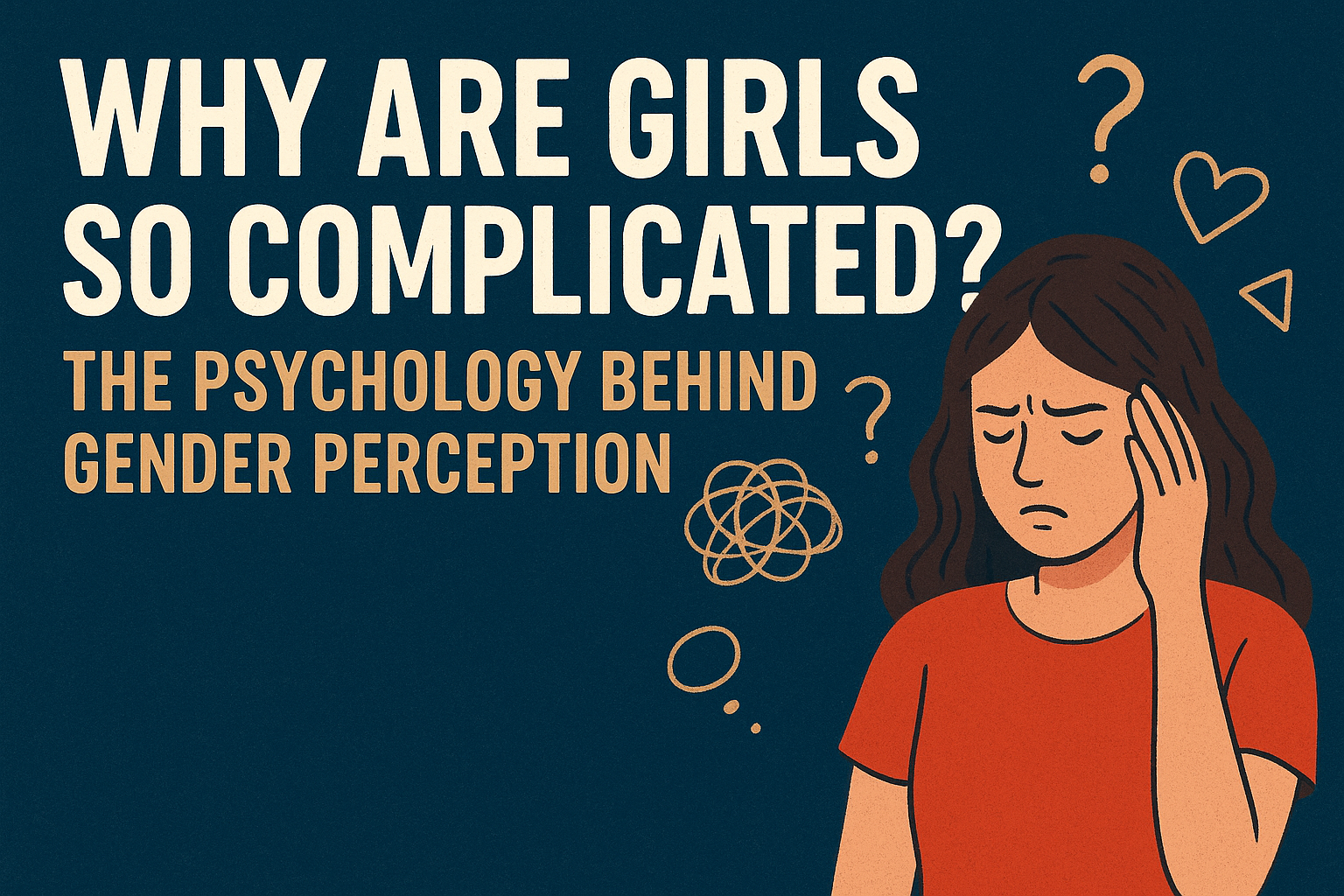The age-old question “Why are girls so complicated?” has puzzled many people, particularly men, for generations. This perception of female complexity has become deeply embedded in popular culture, from casual conversations to relationship advice columns. However, the reality is far more nuanced than this simple stereotype suggests. Understanding the psychology behind this perception requires examining biological factors, social conditioning, communication differences, and the myths that perpetuate these beliefs.
The Myth of Female Complexity
The notion that women are inherently more complicated than men is largely a misconception rooted in misunderstanding rather than scientific fact. Research suggests that this perception often stems from different communication styles and societal expectations rather than actual complexity. Women are frequently perceived as complicated, fickle, and hard to understand, but this perception may say more about the observer than the observed.
Individuality and diversity play a crucial role in this misunderstanding. Just like men, women are individuals with unique personalities, experiences, and perspectives. Attempting to generalize the complexities of an entire gender oversimplifies their rich diversity and fails to recognize that each person, regardless of gender, has their own unique set of thoughts, feelings, and behaviors.
Biological and Hormonal Factors
While not making women inherently “complicated,” biological factors do contribute to certain differences that may be perceived as complexity. Hormonal fluctuations in women occur far more frequently than in men throughout the menstrual cycle and different life stages.
Women’s hormones, particularly estrogen and progesterone, fluctuate in rhythmic cycles, with estrogen levels changing up to 100-fold during postpartum periods. These hormonal shifts can impact mood, emotions, sexuality, and desires in ways that may seem unpredictable. Research shows that more than 50% of menstruating individuals with mood disorders experience symptoms that fluctuate across the menstrual cycle.
However, it’s crucial to understand that these biological factors don’t make women more complicated—they simply represent natural physiological processes that influence behavior, just as various biological factors influence men’s behavior in different ways.
Communication Style Differences
One of the primary sources of perceived “complexity” lies in fundamentally different communication approaches between genders. Research reveals distinct patterns in how men and women typically communicate.
Women’s Communication Style:
- Use rapport talk to build and maintain relationships
- Employ more emotive language and expressive communication
- Utilize collaborative discourse strategies during conversations
- Pay attention to interpersonal meanings that lie “between the lines”
- Are more sensitive to subtle emotional cues and nonverbal communication
Men’s Communication Style:
- Use report talk focused on exchanging information and solving problems
- Employ more direct communication styles with factual components
- Focus on solution-oriented language during conflicts
- Are more sensitive to status-related implications in communication
- Tend to be more straightforward and assertive in verbal communication
These different approaches can create misunderstandings. When women communicate to build connections and discuss feelings, men who expect direct, solution-focused communication may perceive this as unnecessarily complex.
Societal Expectations and Gender Roles
Social conditioning significantly contributes to the perception of female complexity. Society places considerable burdens on women through unrealistic standards of beauty, behavior, and success. Women often juggle multiple roles and face conflicting expectations—being nurturing yet assertive, professional yet feminine, independent yet accommodating.
Research shows that gender roles and expectations have negative impacts on women’s mental health, including anxiety, depression, and low self-esteem. The expectation for women to prioritize caregiving and emotional labor can lead to stress and burnout. These societal pressures create layers of consideration that women must navigate, which may appear as “complexity” to those who don’t face similar expectations.
Women are also socially conditioned to be more emotionally expressive and relationship-focused from childhood. This conditioning teaches girls to be nurturing, considerate of others’ feelings, and collaborative in their approach to problem-solving—traits that require more nuanced thinking and consideration of multiple variables.
Emotional Intelligence and Processing
Women generally score higher than men on emotional intelligence tests, demonstrating greater emotional awareness, empathy, and regulation skills. This enhanced emotional intelligence means women are often more attuned to:
- Subtle emotional cues in themselves and others
- The emotional undercurrents in social situations
- The need to consider multiple perspectives when making decisions
- The importance of maintaining harmony in relationships
This heightened emotional awareness can appear as “overthinking” or complexity to those with different processing styles. Women tend to process information externally through discussion, while men often process internally. This difference in processing styles can make women’s thought processes seem more complicated when they’re actually just more visible.
The “Secret Code” Phenomenon
Some relationship experts suggest that the perception of female complexity often stems from women communicating in what appears to be a “secret code”. This doesn’t mean women are intentionally being cryptic, but rather that they may communicate indirectly due to social conditioning that discourages direct expression of needs.
For example, instead of directly stating “I need attention,” some women might initiate conversations about seemingly unrelated topics, expecting their partners to understand the underlying emotional need. This indirect communication style, learned through socialization, can appear complex to those who prefer direct communication.
Multitasking and Cognitive Processing
Research suggests that women may have advantages in certain cognitive areas that contribute to the perception of complexity. Women often excel at multitasking and processing multiple streams of information simultaneously. This ability allows them to consider various factors when making decisions, but it can appear overwhelming or unnecessarily complex to those who prefer linear thinking.
Women’s brains may exhibit greater connectivity between hemispheres, potentially enhancing intuitive thinking, empathy, and verbal communication skills. This enhanced connectivity allows for more integrated processing of information, considering emotional, social, and practical factors simultaneously.
Breaking Down the Stereotypes
Understanding the psychology behind perceived female “complexity” helps dispel harmful stereotypes and promotes better communication between genders. The key insights include:
Women aren’t inherently more complicated—they often operate within different social expectations and communication frameworks that require more nuanced navigation. The perception of complexity frequently reflects differences in communication styles, emotional processing, and social conditioning rather than actual complexity.
Both genders have complexity—men’s complexity may be less visible due to different socialization patterns that encourage emotional suppression and direct communication. Men may actually be more complicated in some ways, but their conditioning makes this complexity less apparent in daily interactions.
Context matters significantly—what appears complex in one context may be perfectly logical in another. Women’s consideration of multiple factors in decision-making reflects sophisticated thinking rather than unnecessary complication.
Conclusion
The question “Why are girls so complicated?” reveals more about societal perceptions and communication differences than about actual female complexity. Understanding these differences—from biological factors and hormonal influences to communication styles and social conditioning—helps create more empathetic and effective interactions between genders. Rather than viewing women as complicated, we can appreciate the sophisticated emotional intelligence, multitasking abilities, and relationship-building skills that contribute to this perception. By recognizing that both men and women have their own forms of complexity shaped by biology, psychology, and society, we can move beyond harmful stereotypes toward more understanding and productive relationships.

